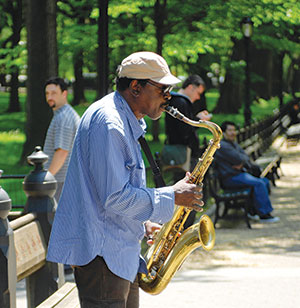
Amplified or acoustic, street performers will be required to adhere to noise level standards mandated by the city, and the police are being asked to enforce them.
By Harry Kane
In Somerville, street performers have been given the go-ahead to play music or perform, but some residents complain that the noise is too loud and want the police to investigate these noise disturbances a bit more often.
The Somerville Police Department and Inspectional Services use decibel meter readers to monitor the noise levels and manage street performers in neighborhood squares. And while aldermen understand the intrinsic value of allowing street performers to showcase their musical talent, they want performers to abide by the noise level code.
“We like having street performers,” Ward 6 Alderman Rebekah L. Gewirtz said. “They enliven our squares and bring authenticity.”
At the same time, Gewirtz said, these performers need to respect the noise ordinance. “If there are street performers that are going over the decibel level limit, I would like to see the police making note of this and letting street musicians know.
Deputy Chief Michael Cabral said, “We do not get a lot of complaints,” in reference to the noise made by street musicians.
During the Alderman meeting on Oct. 24, an order was submitted by Alderman Gewirtz that Somerville Police Chief Thomas Pasquarello investigate noise ordinance violations in association with street performers in Davis Square and take necessary steps to alleviate the problem.
“We need to find this balance,” Gewirtz said.
In April of 2013, aldermen eased regulations for street performers. The old code disallowed performers or demonstrators in all street activity performances unless it was a festival or military parade. Aldermen thought this was unconstitutional and detrimental to the spirit of an open and democratic society, and therefore made amends by allowing street performers to take back the streets.
Still, performers are subject to fines if they break the noise ordinance regulations. “We create certain rules for public spaces,” said Gewirtz in April of this year, “so that we can avoid that problem, when at the same time guarantee people their individual liberties.”
But now, aldermen are hearing from their constituents who claim the noise emanating from the amplifiers is just too much. “We want to see street performers, but we also want to see residents enjoy their quality of life while they are at home,” Gewirtz said.
A key component of this balance, said Gewirtz, is making sure that the street performers are allowed to perform but within the levels of the noise ordinance requirements. Gewirtz along with other aldermen are asking that the ordinance be enforced a bit better than before.
Alderman-At-Large Jack Connolly works less than a 100 yards from where street performers play. If the wind is blowing in a certain way with the amplification, he said, and it’s turned up too loud, “sometimes it’s an open air concert for all within two blocks.”
Nobody has an issue about who performs and when they are out there, Connolly added, but, “when it sounds like it’s in your backyard that’s when it becomes a problem.”
Connolly reminded the Board that the City of Cambridge apparently designated city workers to monitor and measure the level of decibels within a 20-foot perimeter of any given performance. If the performer is found to be playing over the legal decibel level, the meter readers ask the performers to turn off their amplifier or turn it down so it is in acceptable range.
“I’m not sure we’re going to get that effective with it,” Connolly said, referring to the Cambridge system. In Somerville, the police department is in charge of the monitoring responsibility.
Right now the performers are “totally unregulated,” Connolly said. “They can come and perform any time they want, but the noise ordinance should be enforced.”
The current noise level ordinance allows for up to 75 decibels for a short duration of 10 minutes during the daylight hours. But if the performer wishes to play for any longer, the acceptable maximum permissible sound level cannot exceed 70 decibels, and that’s only during daylight hours. If the performer wants to play in the evening in a residential district in excess of two hours, the ordinance restricts the noise level to 50 decibels.
Fifty decibels would be the equivalent of noise emanating from a quiet restaurant, according the City of Somerville’s website, which clearly defines the noise level regulations under the code of ordinances section. The recommended maximum noise is 75 decibels, which is equivalent to the noise that “average traffic” produces.
“We live in a very congested city and noise is definitely an issue,” Alderman-At-Large Dennis M. Sullivan said. He added that the city currently has a limited number of decibel meter readers. “The police are the only ones capable of performing such a test,” he said.
“I think we have to expand the capability, put it in other hands. The police department is a great place to have it, but also inspectional services,” Sullivan added.
Apparently, when the noise ordinance was drafted, it specifically required Inspectional Services and the Police Department to have at least one decibel meter reader. “If they don’t have them, they should have them,” Alderman Thomas F. Taylor said.
Ward 2 Alderman Maryann Heuston requested that the purchasing department procure additional decibel meter readers to “fast-track” the noise ordinance enforcement. That item was approved and will go to the Finance Committee.
The police department currently has two decibel meter readers. Deputy Chief Cabral said that they do not need any more because the ones they have are sufficient.












Reader Comments